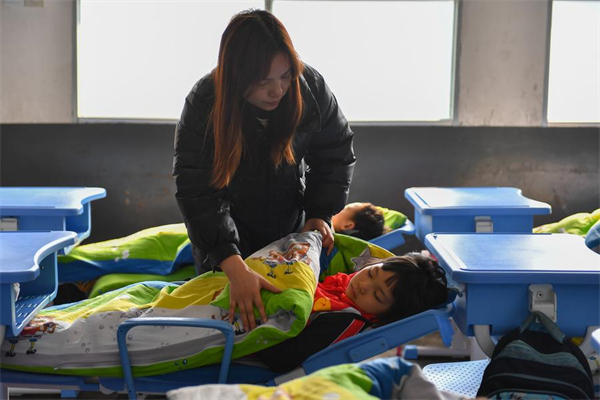新华网 2024-03-25 15:58:55

A teacher tucks a student up during the noon break at a primary school in Liuyang City, central China's Hunan Province, Jan. 10, 2024. (Xinhua/Chen Zeguo)
CHANGSHA, March 21 (Xinhua) -- Ma Xiaojuan, a rural teacher from central China's Hunan Province, adeptly juggles multiple responsibilities, serving as a form teacher, while also teaching English and music, and even dedicating half an hour each day to telling bedtime stories to boarding students.
Ma, 31, has worked at the Caijiagang township middle school for nine years. Her career began with a simple request from students for bedtime stories and was fueled by her determination to foster their holistic development.
In addition to offering care and support to students, Ma has always shared knowledge through singing and storytelling, fostering an enthusiasm for learning among her students.
Engaging with children with virtue and love brings her the utmost joy and fulfillment, Ma said.
Ma credits her career choice to her time at Hunan First Normal University (HFNU). She is among the approximately 120,000 teachers who have been trained by this institution based in Changsha since the founding of the People's Republic of China (PRC) in 1949.
The university's history can be traced back to a classical learning academy established as early as the 1160s. In 1903, it underwent a transformation into a teachers' school, beginning to provide modern pedagogical education. Among its distinguished alumni is late Chinese leader Mao Zedong.
When the PRC was founded, more than 80 percent of China's population was illiterate. Committed to "serving the cultural and educational work of the people," the institution provided about 30,000 teachers to a national campaign aimed at boosting literacy rates among the people.
Through persistent efforts, China successfully achieved the widespread implementation of nine-year compulsory education and eradicated illiteracy among young and middle-aged individuals within a span of 25 years. The gross enrollment rate of high schools increased from 1.1 percent in 1949 to 88.8 percent in 2018. Today, China boasts the largest education system in the world.
In January 2023, Ma was elected deputy to the 14th National People's Congress. During the annual session of the national legislature earlier this month, she put forward proposals for increased attention to the workload and mental health of teachers in rural areas.
In pursuit of delivering higher-quality and more equitable education, China has provided extra support to rural areas grappling with shortages of teaching staff.
In an effort to address the shortage of competent teachers in rural areas, targeted training programs were initiated on a trial basis in 2007.
Statistics show that since 2012, such programs nationwide have attracted about 45,000 normal school students annually to teach at rural schools, with government subsidies benefiting around 1.3 million rural teachers in the underdeveloped central and western regions.
Inspired by HFNU's commitment to serving the country's mission, successive generations of graduates from the institution have opted to devote themselves to areas where their skills are most needed.
Li Jie, a junior student at the school of mathematics and statistics, said that she plans to teach in rural areas after graduation. As many children in the countryside are often left behind by parents working in urban areas, and teachers are the adults with whom they have the most contact, she sees an opportunity to make a significant difference in their lives.
"I hope that I can contribute to the rural communities by not only imparting knowledge to children but also providing them with additional care and support," Li said.
HFNU, evolved from a classical learning academy to a normal school, and now recognized as a prominent institution for teacher education, is embarking on a new journey towards the future of teacher training.
The information and digital era, as well as the advent of artificial intelligence, has brought about profound changes in the educational requirements for future teachers, noted Luo Chengyi, secretary of the Communist Party of China committee of the university.
As China is striving to build itself into a strong country and realize national rejuvenation through its modernization drive, normal schools and colleges are shouldering the responsibility of nurturing talents capable of advancing this mission.
It is crucial to enhance the capability of future teachers to use artificial intelligence for optimizing their teaching methodologies, as well as improving their skills in conducting smart technology-enhanced teaching, said Liu Liqun, a professor at HFNU.
责编:田梦瑶
一审:田梦瑶
二审:秦慧英
三审:黄晓辉
来源:新华网
我要问



 下载APP
下载APP 报料
报料 关于
关于
 湘公网安备 43010502000374号
湘公网安备 43010502000374号